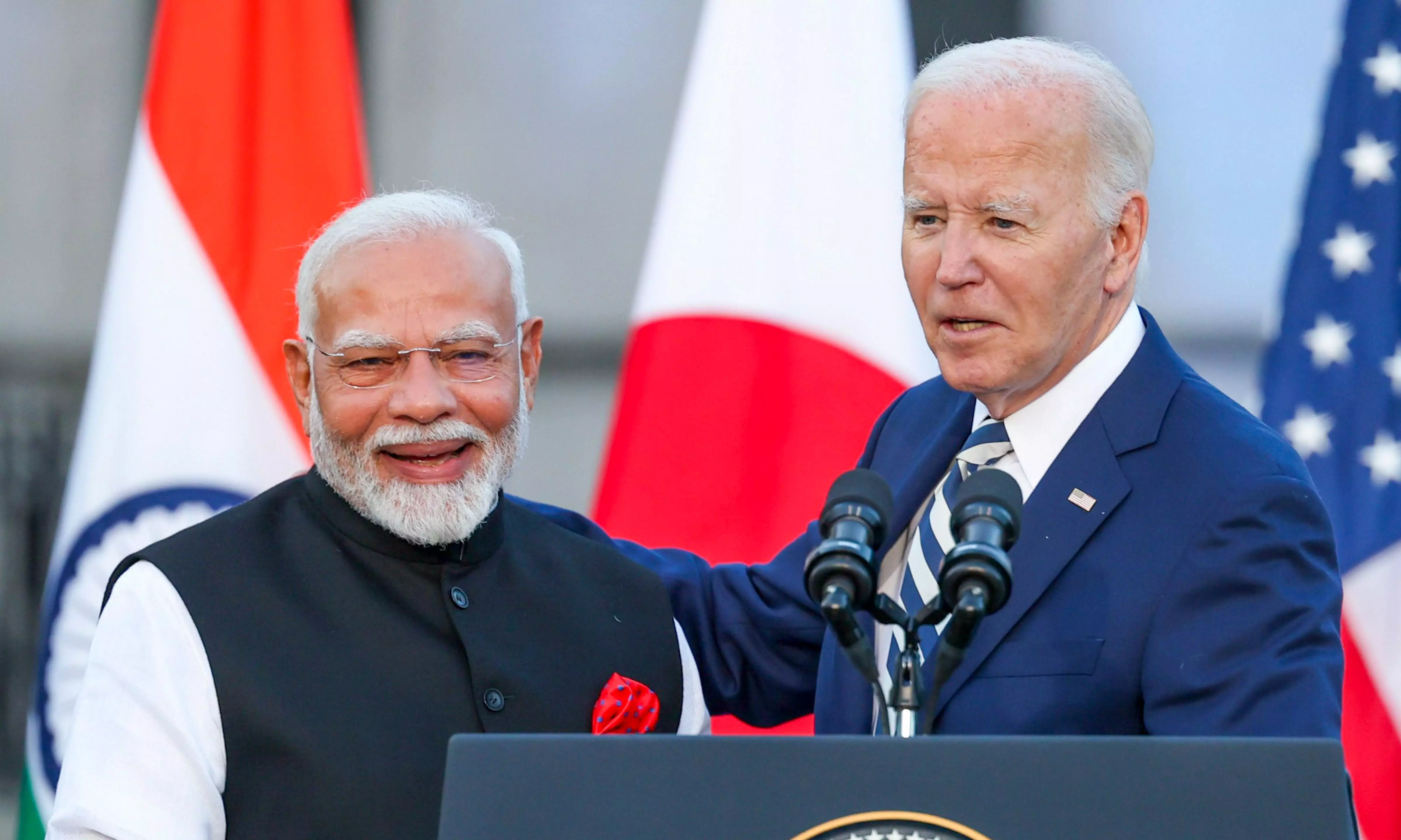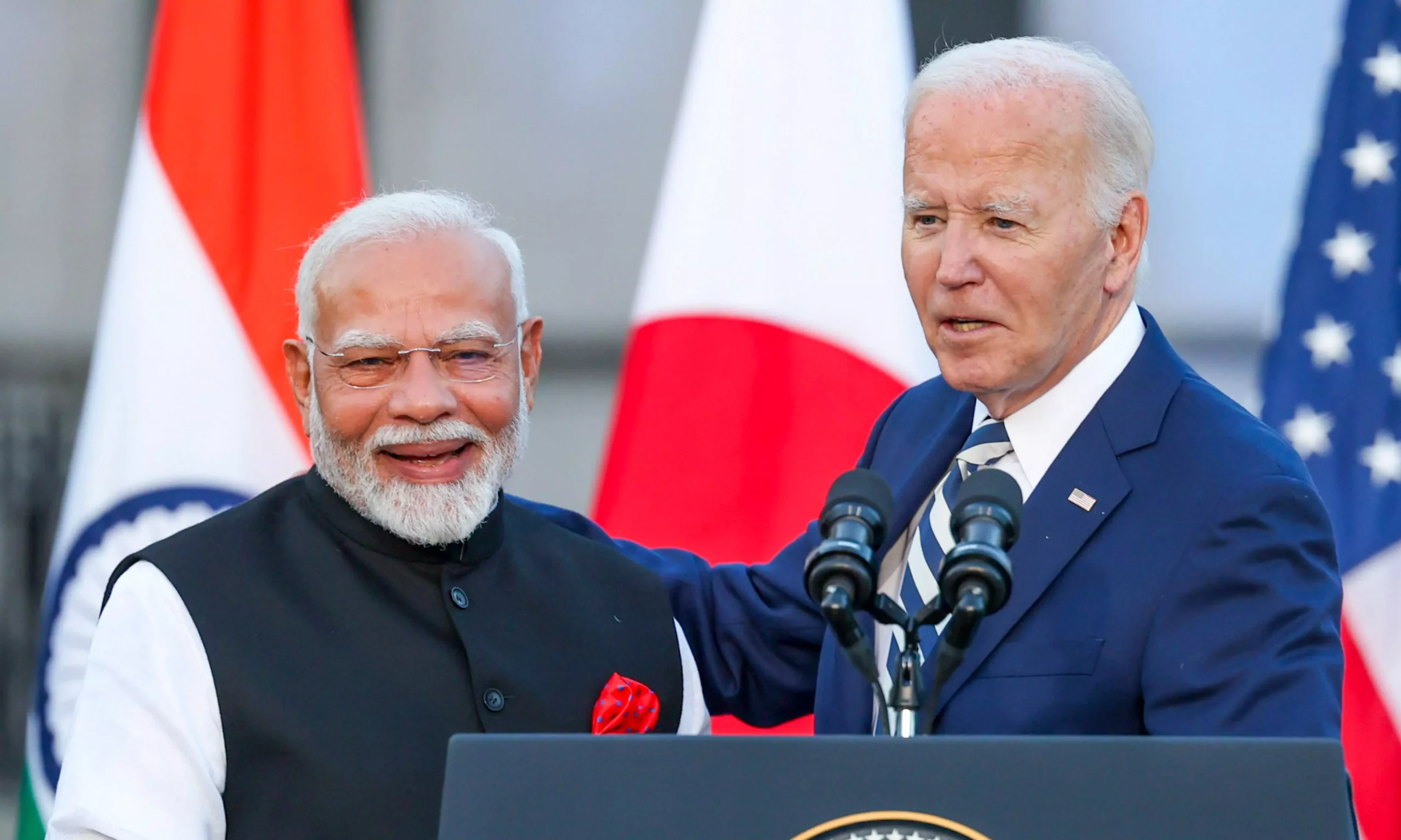
New Delhi/Wilmington: Prime Minister Narendra Modi and United States President Joe Biden on Sunday affirmed the bilateral Comprehensive Global and Strategic Partnership between both nations and termed it “the defining partnership of the 21st century” for the global good. Both leaders “welcomed ongoing efforts to deepen” the bilateral military partnership and interoperability to maintain a free and open Indo-Pacific.
The Prime Minister held an “extremely fruitful” meeting with the US President on the margins of the Quad summit in Wilmington, Delaware, during which the two leaders discussed ways to further enhance bilateral cooperation in areas of mutual interest and exchanged views on global and regional issues, including the Indo-Pacific region and beyond.
Mr Modi, who is in the US on a three-day visit, was on Saturday welcomed by Mr Biden at his residence in Greenville, Delaware, where the two leaders hugged each other. Mr Biden held Mr Modi’s hand as he led him into the house where the bilateral talks took place.
A joint statement issued after the meeting said the India-US partnership is “decisively delivering on an ambitious agenda that serves the global good”.
Mr Modi and Mr Biden expressed confidence in the strength and continuing resilience of the relationship and their belief in its significance for all areas of human endeavour between the two countries, the ministry of external affairs statement said.
The Prime Minister emphasised that India and the US today enjoy a comprehensive global strategic partnership that covers all areas of human endeavour, driven by shared democratic values, convergence of interests and vibrant people-to-people ties.
According to a joint statement, the two sides welcomed a joint roadmap comprising an initiative to accelerate the expansion of safe and secure clean energy supply chains through American and Indian manufacturing of clean energy technologies and components, under which both nations in the initial phase will work together to unlock US$1 billion of multilateral financing to support projects across the clean energy value chain.
In what is being seen as important for national security, the two leaders also hailed a watershed arrangement to establish a new semiconductor fabrication plant. The move is being seen as a huge leap in the technological prowess of Indian companies.
Later, at a special media briefing, foreign secretary Vikram Misri said there was a “personal and emotional connection between the two leaders”. He quoted Mr Modi as having told Mr Biden during the bilateral meeting that while he (the US President) had already opened the doors of his heart earlier to his guest, he had now on this occasion opened the doors of his home as well.
Mr Misri said that while noting that this is a historic period that has seen the United States and India reach unprecedented levels of trust and collaboration, the two nations decided to ramp up ties in a wide range of areas — from defence, supply chains, clean energy, critical technologies, space, economic partnership, global maritime security and healthcare.
The US President “commended the Prime Minister for his historic visits to Poland and Ukraine, the first by an Indian Prime Minister in decades, and for his message of peace and ongoing humanitarian support for Ukraine, including its energy sector, and on the importance of international law, including the UN charter.
Asked whether Mr Modi had discussed Ukraine conflict resolution proposals with Mr Biden, the foreign secretary reiterated that India is having a “set of conversations” with its partner nations on resolution of the conflict, adding that India is “able to talk to multiple interlocutors” on the matter.
The two leaders “recognised the remarkable progress under the US-India Defence Industrial Cooperation roadmap, including ongoing collaboration to advance priority co-production arrangements for jet engines, munitions and ground mobility systems” and also “welcomed efforts to expand defence industrial partnerships. They further “applauded the recent conclusion of the Security of Supply Arrangement (SOSA), enhancing the mutual supply of defence goods and services and committed to advance ongoing discussions on aligning their respective defence procurement systems to further enable the reciprocal supply of defence goods and services.
Both India and the US leaders “reaffirmed their support for the freedom of navigation and the protection of commerce, including critical maritime routes in West Asia where India will assume co-lead in 2025 of the Combined Task Force 150 to work with combined maritime forces to secure sea lanes in the Arabian Sea”.
The Prime Minister and the US President “welcomed India’s signature and ratification of the agreements under Pillar III and Pillar IV (clean energy and anti-corruption efforts) and the overarching Agreement on the Indo-Pacific Economic Framework for Prosperity (IPEF), an American initiative with 13 other Indo-Pacific nations, including India, that began two years ago. They also welcomed the new US-India drug policy framework for the 21st century and its accompanying memorandum of understanding (MoU) that will deepen collaboration to disrupt the illicit production and international trafficking of synthetic drugs and precursor chemicals and deepen a holistic public health partnership.
Both leaders also “affirmed that the US-India partnership must be anchored in upholding democracy, freedom, the rule of law, human rights, pluralism and equal opportunities for all as our countries strive to become more perfect unions and meet our shared destiny”.
In a statement, New Delhi said that Mr Modi “conveyed his appreciation for the unparalleled contributions made by Mr Biden in giving impetus to the India-US partnership”. The PM also emphasised that India and the US today enjoy a comprehensive global strategic partnership that covers all areas of human endeavour.
Mr Biden “expressed his immense appreciation for India’s leadership on the world stage, particularly Mr Modi’s leadership in the G-20 and in the Global South and his commitment to strengthen the Quad to ensure a free, open and prosperous Indo-Pacific.” He reiterated American support to reform global institutions to reflect India’s important voice, including permanent membership for India in a reformed UN Security Council.
The US President also “welcomed India’s decision to set a uniform Goods and Services Tax (GST) of 5 per cent on the maintenance, repair and overhaul (MRO) sector, including on all aircraft and aircraft engine parts.
The two leaders also “lauded the growing defence innovation collaboration between our governments, businesses and academic institutions fostered by the India-US Defence Acceleration Ecosystem (INDUS-X) initiative” that was launched last year and appreciated efforts “to facilitate pathways for defence and dual-use companies in the INDUS-X network to access premier testing ranges in both countries”.
Mr Modi and Mr Biden “applauded the success of the Initiative on Critical and Emerging Technology (iCET) in deepening and expanding strategic cooperation across key technology sectors, including space, semiconductors, and advanced telecommunications.
On space cooperation, the two leaders welcomed progress toward the first joint effort by NASA and ISRO to conduct scientific research onboard the International Space Station in 2025.
On the clean energy front, the two leaders “highlighted the US International Development Finance Corporation’s (DFC) partnership with India’s private sector to expand clean energy manufacturing and diversify supply chains.
